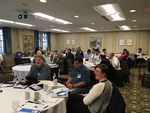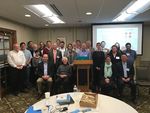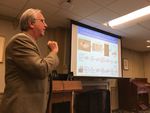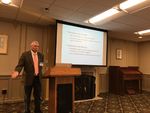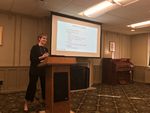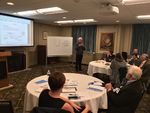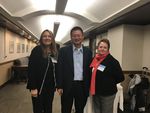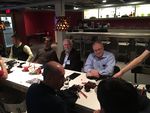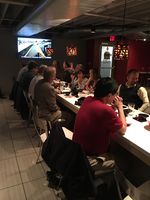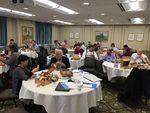Microbiology for the CTSA: Ontological Approaches
Sixth Annual Workshop of the Clinical and Translational Science Ontology Group
Announcement
The Clinical and Translational Science Ontology Group (CTSOG) invites you to join us this October 25-26, 2017 in Ann Arbor, Michigan to discuss the state of the art in ontologies and terminologies towards standardized data and metadata and data integration in various areas of clinical and translational microbiology. Example areas of discussion include microbiomes, host-microbiome interactions, microbial pathogens (e.g., bacteria, viruses, and parasites), infectious diseases, host immunity, vaccines and drugs treating infectious diseases, and vaccine and drug adverse events and safety. We will focus on how ontologies can be developed and used to support clinical and translational microbiology data recording, standardization, and analysis.
We are happy to announce two keynote speakers:
- Dr. Richard Scheuermann (J. Craig Venter Institute)
- Dr. Chris Stoeckert (UPenn)
This workshop will include four sessions.
- Session I. Microbiomes and Host-Microbiome Interactions organized by Oliver He
- Session II: CTSO Breaking Topics: Informatics Metrics organized by Amanda Hicks and Bill Hogan
- Session III. Infectious Disease Ontology (IDO) and related ontologies and topics organized by Lindsay Cowell
- Session IV: Sharing Clinical Microbiology Data Across the CTSA Consortium organized by Bill Hogan
Clinical laboratory data are a routine feature in research data repositories and their associated query mechanisms such as i2b2. However, the inclusion of microbiology data from the clinical laboratory are much less frequently present. Issues include which ontologies to use to identify micro-organisms, sensitivity tests, sensitivity test results, and the microbiology tests performed. Also, linking "bugs to drugs" (identified micro-organisms to their sensitivity tests/results) is often quite complicated to do accurately and reliably. This session will explore these and other issues, with an eye towards optimal modeling of clinical microbiology data for translational research.
MICHR has also generated an announcement website for our workshop: https://microbiologyctsa17.splashthat.com/
Organizers
Workshop Co-organizers:
Yongqun “Oliver” He (University of Michigan Medical School, Ann Arbor, MI), yongqunh@med.umich.edu
Amanda Hicks (University of Florida College of Medicine, Gainesville, FL), aehicks@ufl.edu
CTSOG Co-chairs:
Bill Hogan (University of Florida College of Medicine, Gainesville, FL), hoganwr@ufl.edu
Barry Smith (University at Buffalo, Buffalo, NY), phismith@buffalo.edu
MICHR organizer:
Jamie Racklyeft, Communication Director, MICHR, jracklye@med.umich.edu
ULAM organizers:
Veronica Rieberger, Administrative Specialist, vrieberg@med.umich.edu
Teresa Fracala, Executive Assistant to Department Chair, ULAM, University of Michigan Medical School, fracalat@med.umich.edu
Sponsors
- The Michigan Institute for Clinical & Health Research (MICHR), a University of Michigan institute and CTSA hub supported by the National Center for Advancing Translational Sciences at the National Institutes of Health.
We are grateful also to the MICHR and Dr. George Mashour (MICHR director) for sponsoring $3,000 for supporting two keynote speakers' attendance at the meeting.

- The Unit for Laboratory Animal Medicine (ULAM) at the University of Michigan Medical School, We are also grateful to Dr. Bob Dysko, the previous ULAM director in the University of Michigan Medical School, for his generous support of $4000 for catering and junior scholars attending the workshop (See more information below).
Date
October 25 (Wednesday) - 26 (Thursday), 2017
Venue
Henderson Room at the Michigan League, University of Michigan, Ann Arbor, MI.
Address: 3rd floor, Michigan League, 911 N. University, Ann Arbor, MI 48109-1265 Google map
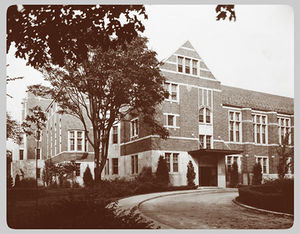
Schedule Day 1: October 25
Wednesday Morning
8:00am: Registration and Breakfast
8:45am: Welcoming remarks, by Oliver He Slides, Barry Smith, Kanchan Lota (MICHR managing director) Slides
Session I: Microbiomes and Host-Microbiome Interactions
Session coordinator: Oliver He
9:00am: OMP: The ontology for microbial phenotypes - Deborah A. Siegele / Jim Hu Slides
9:20am: The MicrO ontology; enabling the acquisition of higher-order knowledge of phenotypes from prokaryotic taxonomic descriptions and the construction of very large character matrices - Carrine E. Blank Slides
9:40am: MEOWL: Microbial Environments described using OWL - Ramona L. Walls Slides
10:00-10:30am: Break
10:30-11:45 am: Development and applications of the Ontology of Host-Microbiome Interactions (OHMI).
This section includes the following talks:
10:30-11:00 am: Brief OHMI introduction and OHMI representation of rheumatism-associated host-microbiome interactions - Oliver He Slides
11:00-11:15 am: Ontology of Host-Microbiome Interactions use case at UPenn - Jie Zheng Slides
11:15-11:30 am: Ontology of Host-Microbiome Interactions use case at MUSC - Jihad Obeid / Alexander Alekseyenko Slides
11:30-11:45 noon: Ontology of Host-Microbiome Interactions use case at Duke - Anna Maria MasciSlides
11:45-12:15: Discussion on the morning session topics
12:15: Lunch
Wednesday Afternoon
Session II: CTSO Breaking Topics: Informatics Metrics
Session coordinator: Amanda Hicks
1:00pm: Ontological Representation of Software to Make it FAIR - Bill Hogan
1:30pm: FAIR principles and the Immune Epitope Database (IEDB) - James Overton Slides
2:00pm: Using cyberinfrastructure to make life sciences data FAIR: lessons learned - Ramona Walls Slides
2:30pm: Measuring Interannotator Agreement in the Florida Annotated Corpus for Translational Science - The difficult ontological task - Amanda Hicks Slides
3:00pm: Break
3:30pm: Discussion
4:15pm: Keynote address 2: Identification and representation of cellular biomarkers using high-content single cell cytometry and sequencing technologies Dr. Richard Scheuermann (J. Craig Venter Institute)

Abstract: A fundamental characteristic of multicellular organisms is the specialization of functional cell types through the process of differentiation. These specialized cell types not only characterize the normal functioning of different organs and tissues, they can also be used as cellular biomarkers of a variety of different disease states and vaccine responses. In order to serve as a reference for cell type representation, the Cell Ontology has been developed to provide a standard nomenclature of defined cell types for comparative analysis and biomarker discovery. Historically, these cell types have been defined based on unique cellular shapes and structures, anatomic locations, and marker protein expression. However, we are now experiencing a revolution in cellular characterization resulting for the application of new high-throughput, high-content cytometry and sequencing technologies. The resulting explosion in the number of distinct cell types being identified is challenging the current paradigm for cell type definition in the Cell Ontology. In this presentation, we will present examples of state-of-the-art cellular biomarker characterization using high-content mass cytometry and single cell RNA sequencing, and discuss strategies for standardized cell type representations based on the data outputs from these cutting-edge technologies.
Richard Scheuermann, Ph.D., is the Director of the La Jolla Campus at the J. Craig Venter Institute (JCVI) and an Adjunct Professor of Pathology at U.C. San Diego. Dr. Scheuermann has applied his deep knowledge of molecular immunology and infectious disease to the development of novel computational data mining methods and knowledge representation approaches, including the development of biomedical ontologies and their use in data mining, and the development of novel methods for gene expression, protein network, flow cytometry, and comparative genomics data analysis. These computational methods have been made available through several public database and analysis resources, including the Influenza Research Database (IRD; https://www.fludb.org), the Virus Pathogen Resource (ViPR; https://www.viprbrc.org) and the Immunology Database and Analysis Portal (ImmPort; https://immport.niaid.nih.gov/) supported by the U.S. National Institutes of Health.
6:30pm: Dinner (Note: A nice Ann Arbor restaurant will be reserved for those who wish to join. The cost of dinner is not included in the workshop.)
Schedule Day 2: October 26
Thursday Morning
8:00am: Registration and Breakfast
8:20am: Remarks from Dr. Bob Dysko (University of Michigan)
8:30am: Keynote address 2: Ontology support of clinical, epidemiological, and microbiome data exploration - Dr. Chris Stoeckert (UPenn) Slides
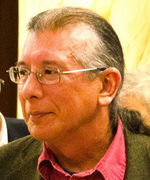
Abstract: The challenge of working with Big Data is not only scale but in many situations, also the complexity of what the data is about. This is especially true of clinical and epidemiological data where data is obtained for critical variables but often in an ad hoc and inconsistent manner. Critical understanding of how these variables impact health and host microbiome interactions requires analyses across different studies and data sources. Ontologies are key to meeting this challenge through providing semantic harmonization of common and specialized types of data; the realist process approach followed by ontologies in Open Biomedical Ontologies (OBO) Foundry (http://obofoundry.org/) provides a common understanding of what the data is about. We are using application ontologies based on OBO Foundry ontologies to encode our understanding of data dictionaries in multiple projects. The projects range from the epidemiology and transmission patterns of malaria to enteric pathogen influence on morbidity and mortality in young children. An additional challenge is to transform ontologic representations into user-friendly web interface terminologies for data exploration. MicrobiomeDB (http://microbiomedb.org/mbio/) provides a web-based data-mining platform for interrogating microbiome experiments and makes use of our ontology and web interface terminology approach. The real power of ontologies will come from instantiation of data in these ontologies and the ability to do inferencing and searches of such data. A goal of the TURBO (Transforming and Unifying Research with Biomedical Ontologies) project at Penn is to instantiate an OBO Foundry-based application ontology with clinical data to support research starting with finding patient cohorts and biobank specimens.
Chris Stoeckert is a Research Professor of Genetics and faculty in the Institute of Biomedical Informatics at the University of Pennsylvania. He works on databases supporting the mining of complex datasets. Currently, he is co-investigator of the NIAID EuPath Bioinformatic Research Center supporting research on eukaryotic pathogens and a co-investigator of the NIA Genomics Alzheimers Disease Storage Site project supporting research of AD and related dementias. That and prior database work has gotten him involved in development of data standards such as MIAME (Minimal Information About a Microarray Experiment), MAGE-TAB format standard for reporting microarray experiments, and the development of biomedical ontologies such as the MGED Ontology. He is a core developer of the Ontology for Biomedical Investigations (OBI), leads the development of the Ontology for Biobanking (OBIB), and serves on the OBO Foundry Operations Committee and Editorial Working Groups. He is faculty director of the TURBO (Transforming & Unifying Research with Biomedical Ontologies) project at Penn aimed at semantic harmonization and integration of clinical data.
9:30-9:45am: Break
Session III: Infectious Disease Ontology (IDO) and related ontologies
Session coordinators: Lindsay Cowell, Barry Smith
9:45am: The Present State of the Infectious Disease Ontology - Lindsay CowellSlides, Barry Smith
10:30am: Break
10:45am: Infectious Disease Ontology Round Table - Lindsay Cowell, Barry Smith, Oliver HeSlides, Chris Stoeckert Slides , Richard Scheuermann
11:45am: The Antibody Ontology - Alex Diehl
12:15pm: Lunch
Thursday - Afternoon
Session IV: Sharing Clinical Microbiology Data Across the CTSA Consortium
Session coordinator: Bill Hogan
1:00pm: Microbiology Data in the Real World -- Examples and Thoughts from One Site - Gigi Lipori Slides
1:30pm: Tissue Collection and Data Management in the Microbiome Clinical Studies - Dominick Lemas
2:00pm: Working session: Building the Microbiome Ontology Slides - Introduced by Barry Smith
4:00pm: Close
Rationale
The CTSA Program has always emphasized the need for data standards to promote sharing and comparison of data across the CTSA Consortium and beyond. Yet creation and adoption of such standards is still painfully slow. Urgent action remains necessary. History shows the high value of standard terms, definitions, and symbols (i.e. ontology) to science. But the creation and adoption of such standards often takes decades. Translational science requires a consistent set of standard ontologies spanning all scales, from molecule to organism to population. In this year's meeting we focus on resources for describing data at the scale of micro-organisms.
Goals
The Clinical and Translational Science Ontology Group was established in 2012 to leverage the use of common ontologies to support different aspects of information-driven clinical and translational research. The focus of this meeting is to explore new and existing uses of common ontologies to support creation, sharing, and analysis of clinical data.
Like its predecessors in the series, this meeting is designed to bring together clinical and translational scientists from across the CTSA Consortium who are interested in using ontologies to promote discoverability and interoperability of biomedical data.
Persons interested in attending or in presenting at the meeting should write to [mailto:].
Travel Fund Application
We have secured $2000 as a travel fund, owing to Dr. Bob Dysko (the director of the Unit for Laboratory Animal Medicine in the University of Michigan Medical School), to support new investigators to attend the workshop.
If you are interested, please submit a short vita with a rationale for attendance to Dr. Oliver He at yongqunh@med.umich.edu by August 30, 2017. Decisions will be made August 31, 2017.
Eventually five travel awards were given to:(i) Amanda Hicks, U. of Florida, our workshop co-chair. (ii) Anna Maria Masci, Duke University; (iii) Jie Zheng, UPenn; (iv) William Duncan, University at Buffalo; and (v) Asiyah Yu Lin, FDA. Congratulations!
Participants
Alekseyenko, Alexander (The Medical University of South Carolina, Charleston, SC)
Blank, Carrine E. (Department of Geosciences, University of Montana, Missoula, MT)
Brochhausen, Mathias (University of Arkansas for Medical Sciences, Little Rock, AR)
Cascalho, Marilia I. (Department of Surgery, University of Michigan Medical School)
Cowell, Lindsay (UT Southwestern, Dallas, Texas)
Diehl, Alexander (University at Buffalo, Buffalo, NY)
Dipert, Randall (University at Buffalo, Buffalo, NY)
Duncan, Bill (Roswell Park, Buffalo NY)
Freddolino, Peter (Department of Biological Chemistry, University of Michigan Medical School)
Frederickson, Lynne (Taubman Health Sciences Library, University of Michigan, Ann Arbor, MI)
Gross, Colin (University of Michigan, Ann Arbor, MI)
Guo, Kai (University of Michigan, Ann Arbor, MI)
He, Yongqun (Oliver) (University of Michigan Medical School, Ann Arbor, MI)
Hicks, Amanda (Health Outcomes and Policy, University of Florida, Gainesville, FL)
Hogan, William (Bill) (Health Outcomes and Policy, University of Florida, Gainesville, FL)
Hu, Jim (Department of Biochemistry and Biophysics, Texas A&M University, College Station, TX)
Huang, Yvonne J. (Division of Pulmonary & Critical Care Medicine, University of Michigan Health System, Ann Arbor, MI)
Hur, Junguk (Dept. of Biomedical Sciences, School of Medicine and Health Sciences, University of North Dakota)
Landis-Lewis, Zach (University of Michigan Medical School, Ann Arbor, MI)
Lemas, Dominick (Dept. of Health Outcomes and Policy, University of Florida)
Lin, Asiyah Yu (FDA, Silver Spring, MD)
Lipori, Gigi (UF Health, Gainesville, FL)
Manion, Frank (University of Michigan, Ann Arbor, MI)
Masci, Anna Maria (Duke University, Durham, NC)
Obeid, Jihad (The Medical University of South Carolina, Charleston, SC)
Ong, Edison (University of Michigan, Ann Arbor, MI)
Overton, James (Toronto, Ontario, Canada)
Scheuermann, Richard (J. Craig Venter Institute, La Jolla, CA)
Seekatz, Anna (Division of Infectious Diseases, University of Michigan Medical School)
Siegele, Deborah A (Dept. of Biology, Texas A&M University, College Station, TX)
Smith, Barry (National Center for Ontological Research, University at Buffalo, Buffalo, NY)
Smith, Sam (DataSmith LLC.)
Soergel, Dagobert (University at Buffalo)
Stoeckert, Chris (University of Pennsylvania Perelman School of Medicine, Philadelphia, PA)
Walls, Ramona L. (CyVerse, Tucson, Arizona)
Wang, Jiahao (University of Michigan, Ann Arbor, MI)
Wang, Haihe (University of Michigan, Ann Arbor, MI)
Wu, Jianfeng (School of Public Health, University of Michigan, Ann Arbor, MI)
Zhang, Wei (Section of General Surgery, University of Michigan Medical School, Ann Arbor, MI)
Zheng, Jie (University of Pennsylvania Perelman School of Medicine, Philadelphia, PA)
Pictures taken from the event
